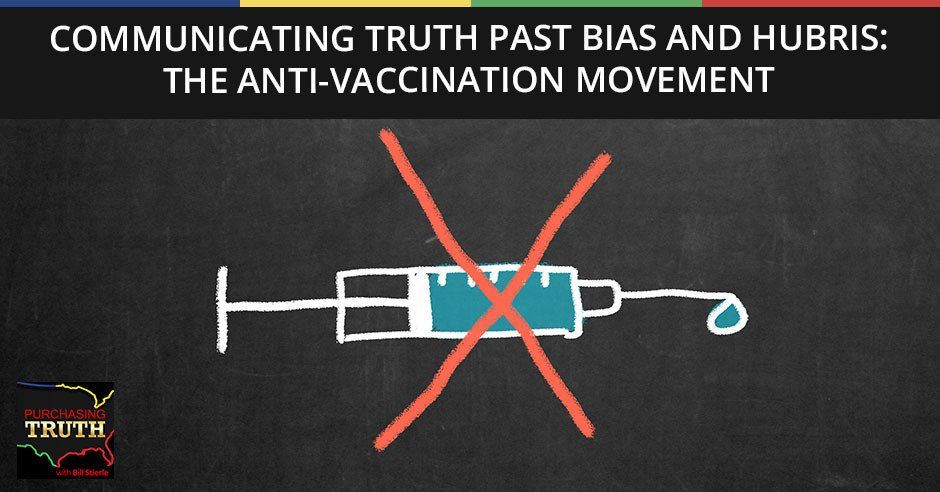Communicating Truth Past Bias And Hubris: The Anti-Vaccination Movement
Subscribe Today!
The current anti-vaccination movement depends on certainty and bias that leads to hubris. How do you effectively communicate truth to change their minds? In this episode, Bill Stierle and Tom discuss how certainty breeds bias and hubris. They talk about communication and how we need to communicate the truth better if we want to sway the thinking of others. Tune in for more insights from Bill and Tom as they wade through current events in search of truth.
---
Watch the episode here
Communicating Truth Past Bias And Hubris: The Anti-Vaccination Movement
We want to talk about something I think is very relevant to everyone in the United States because we're all dealing with COVID-19. There's a very interesting illuminating video that Bill found and shared with me about The Science of Anti-Vaccination. I want to make it clear here. It talks about the science and data of people that are not getting vaccinated. Why? It leads us to understand why people from the beliefs they do are more afraid of getting vaccinated than not.
Tom, I'm so glad we're talking about this because this is taking it out of the political piece, but bring it into brain science, motivation, communication piece, and whether you’re talking about difficult messaging. What we look to face is how do you talk about difficult things? One of the difficult things to talk about is how collectively our beliefs and bias run us. Tom, you and I have talked about the flat Earth mindset on here many times.
When people think and talk about the flat Earth mindset, the people that believe the world is round laugh at the person that has that bias and belief. The trouble with that is you're laughing, but can you individually prove that the Earth is round? That answer is, “No, go ahead and try to explain it.” Everybody got like, “No it's round. There are facts there that know that.” “Go ahead. Tell me which ones.” The pushback that you will get is around how do you prove your own beliefs or biases.
This is where it becomes difficult about how the brain traps us into certain forms of certainty. I have certainty about this thing, whereas we're listening to the voices of others. To use a political thing, it is, “Read the transcript. Have you read this transcript?” “No.” “Do you want other people to read the transcript?” “Yes.” That is, a person listens to another person's point of view and realizes that there is this backdoor with a skeleton key that you can go into somebody else's brain and put in a micro message.
This micro message grows and becomes a seed, plant, then tree or becomes a pile of weeds in the person's brain that says the government is ineffective. Government is this and that. All of a sudden, people don't believe in government and go like, “I want my guy to fix government.” That's not so good. Your guide doesn't believe in government. They want to take the government down. They want to stall the government.
They're there for their respect and recognition. They're not there to change the government. They're there to throw sand in the gears because when they do, you keep reelecting them. It's a little weird that our belief structures can get hijacked in that way. There's the challenge. How do you have an honest discussion when somebody is digging their heels in on a bias and beliefs? Tom, you’ve got plenty of examples of people digging in their heels that we've watched overtime of the things like that.
I certainly am experiencing this and trying to communicate with people, not to battle with them but to try to get people to do what you suggested to do their research, not just agree with an article they read because it happens to be in alignment with their biases but to look at the source material. It's like what you were saying, “Read the transcript.” People are saying, “Everybody should read the transcript.”
People say this all the time, “You should read the transcript. Have you read the transcript? No, but I've heard from others that have read the transcript. You haven't read it yourself. No, but everybody should read the transcript. Yes.” The same thing is true. This is what I think people don't realize. Every article is written out there has source material cited as to where they based the information on, or if they don't, it's an opinion piece and that's from the writer's mind.
Those things are not marked that way. It’s something that's written. All they've got to do is put in the sentence some people say or from what I've researched and their opinion piece gets to be assumed based in some fact. Where is the range of that? It's one thing to call science on saying, “This is the peer-reviewed stuff.” That's one thing to call science on that. Those people are reviewing that are ignoring another set of data over here.
If it's 90% over here or 80%, 70% or 60% over here and there are other pieces of information here, that's called good science is a good curiosity to find those other things. We're in a very tough place because people are not slowing down to spend time. We're not slowing down to spend the money on how do we handle the bigger issue, which is the virus of misinformation. We got two viruses and both of them are playing off of each other.
The COVID virus benefits from the virus of language and belief. One of the things that are tough about this video is it says, “People don't want to be accountable for making a mistake.” When they hear one piece of message about a bad story or, reaction to a vaccine, they'd rather take their chances with either nature or God and say, “It's probably not going to affect me. Therefore, I'm not going to take the vaccine. I'm going to be careful.”
I rationalize that. If there is a religious spin to it, then it’s, “God will protect me. I have to believe that.” There's power in belief in the immune system and having a strength of conviction that our body does do better when we are in a positive and elevated state. It wants to live, pray, and do those things. The immune system is better, but it's not immune. The greatest failure that has taken place here is that people aren't aware of how viruses work.
There hasn't been any widespread public campaign to put the various different little videos together that are necessary to say, “Here's how the virus works. Here's how this thing goes. Here's what happens in a room of people.” It's going to be very unsettling even to think about this thought coming out of my head, but we need an animated, childlike, very young style of video to make an impression about how to protect. What does the protection of a mask do? It has to be very simple and very young because that's the thing that will penetrate, not the high-level discussion about immunology.
We need the schoolhouse rock of vaccination and masks. It sounds like.
That's the way to think about it.
It makes sense that our president, who is not the marketer in chief, the previous president was. They're not marketing. They're not selling this the way it should be. To me, the most fascinating part of this video, The Science of Anti-Vaccination, illuminated something that was not obvious. You mentioned people don't want to be accountable. It's not that people are being irresponsible and not wanting to take responsibility for something. It's just human nature.
Humans think if I decide to take the vaccine or I decide to have my child, who's more than twelve years old, take the vaccine and there's some negative consequence that comes of it like they get sick and have a bad reaction, I've heard of some people who have myocarditis sometimes as a reaction where they have inflammation around the heart for a period of time. The person who made that decision for themselves or their child to take the vaccine doesn't want to live with that consequence. It was their own action that took it. It was self-inflicted. This was the big part that I didn't get until I saw this video.
Whereas if you decide, “I'm not going to take the vaccine. If I get ill or sick, then it was Mother Nature, it was God's will, or it was meant to be, then it's not my fault.” It's somehow easier for them to accept the consequences of something that's not their fault. It’s something that in their mind makeup would be directly their fault.
I don't want to be in that spot where a decision I made was a mistake, which means that as a collective, one of the problems that we're having right now is that we're making a mistake critical. If you make a small, medium, or big mistake, you're going to feel so much guilt and shame that you made a mistake. I don't want to be in the place of I made a mistake, and it was the wrong one, in my kid, myself or somebody else got sick.
I want to be the person that puts my head in the sand, avoids it, or comes up with a bias to protect it. One of the quotes that I've posted around was, “I’m the wisest man alive, for I know one thing, and that is that I know nothing.” Now that's a Socrates quote, but the problem is we don't have that as a general mindset right now. We don't have, “I'm wise because I don't know.” If you don't know something, your mind is going to stay open to curiosity. Once you know something mentally, it shifts into a category of certainty. This pesky thing called hubris comes up.
My belief is real and valid. That's a problem because hubris then looks like, “I believe that guy. Therefore, I can take action because that guy hinted at or told me to, ‘Let's march down there to the White House and let our voices to be known.’” It's a divisive piece. It’s challenging because they're literally hijacking the certainty principle of the way the brain wants to know that I'm okay in the world. It feeds into a lot of very old patterns of trust the king, your father, and your mother. I'm not accountable. My mom and my dad are going to take care of it. The hubris part of it is that the confidence about the truth is extraordinarily tilting.
It seems way out of proportion. It is quite something where people go from a fear of maybe self-inflicting some consequence to then this hubris. It seems to go pretty quickly. We're seeing it a lot at school board meetings across the country. Hubris, to be clear, is excessive pride or self-confidence. It’s the technical definition. We see people advocating and demanding that their children be allowed to go to public school unmasked.
That's very problematic, especially when you go from, “I don't want to have the vaccine because I fear a negative consequence, and that might be my fault.” That's what that video eliminates, among many other things. I recommend people check out that nine-minute video because it's purely science-based. There's no political agenda in it.
You get to the point where people are taking that belief and going so far as not to realize that, in fact, by not wearing a mask if they're un-vaccinated, not only are they putting themselves at great harm but they're putting others at great harm and causing new variants to be made, which may harm all of us. It has a counterproductive impact on what they were trying to protect themselves from with their belief.
How we've got in here regarding hubris? Partly from a military standpoint, we know that by withdrawing from Afghanistan, the hubris of going in there and saying, “We're strong and we can hurt you. You need to listen to us and change your ways.” The person says, “My beliefs, bias, and religion say you don't belong here because we're now going to fight you, come around and keep the pressure on.”
The challenge is that hubris does meet certain needs. It needs certainty and the need for respect because I could speak from a place of strength. I can get recognition. I can stand up at a school board meeting. If that's not available to most people, acknowledge it. It was great that you were able to stand up there. You got the acknowledgment from your peers that believe in the same things. That creates the tribe mentality. Your self-worth and your identity is, “This is my tribe.”
These are the people that believe the same way that I do. You get to say, “I own that seed and that thing.” You are a collective part of ownership and you get to say what you can say, but as far as what you're fighting for and what you're working for is, “We're working on a health issue. We're not working on a freedom issue here.” Freedoms are great just so that they don't kill other people. That's a part of that mindset. Our brain will bounce between various different beliefs and biases and confuse itself.
We're going to click back to the thing that we have some certainty on. The certainty that people have faith in various different religions. They have certainty about things. If I pray and do these things, I am a person of good. There's wonderful confidence that comes with that and a wonderful place. This is not an argument about whether religion or spirituality is good or bad or anything. It's what the conviction of the individual is. They have a conviction and that conviction creates hubris. It creates pride and confidence. That's good until it runs into the numbers.
Until it runs into existing at the expense of others, isn’t that right?
Right, it’s at the expense of others and then the numbers. The reason why I use the word numbers is if they're right, if masks don't help, why did the numbers not show that? Why is the South all red and other places that wear masks, the numbers aren't there? The numbers need to be there. There's a lot of people that don't like math. They have such an aversion to math that they will say, “Those numbers are made up.”
They immediately say like, “We're measuring things here. We can't stop the process of measuring something.” If we let go of that, if we stop measuring things, we take a step into naivete, ignorance, and unawareness. There was a quote inside that video about ignorance as a feature. This is a very difficult discussion. I know we're going to stick the landing here. Ignorance is a feature because it allows us to open up to creativity and curiosity. It also is a detractor because it allows us to go down a path that narrows our ability to have an open discussion. Ignorance is like a toggle switch all of a sudden.
It's a feature, but it also is, “If you're not making the changes, guess what happens?” Your way of thinking doesn't hold up and stays there. All of a sudden, there's a serious consequence to that. It's the waking up of a college student that comes out of college and realizes they've got to take a beginning job. They think they're going to get $100,000 or $500,000 out of the gate. The high school student says, “I don't need this.” They're flipping burgers because that's the only spot. Manufacturing and trades are down, and they're not as needed as much. It's unsettling because the environment then says, “Yeah, guess what?”
In that environment, Mother Nature, if you will, the virus running unchecked is having a say.
Hubris kills integrity and accountability. You can't hold somebody accountable for what they say when they're in a place of excessive confidence. They're holding a belief or bias. There's no argument. There is empathy as the remedy. You can empathize with them and you can slow-walk them to awareness. That's a part of what I get hired to do is to write empathy and compassionate sentences to get them there.
I want everybody to know, I hold up my mirror in the morning and go like, “What biases and beliefs are running right now in your head that is preventing you from doing X, Y, and Z?” I look at my list of things that my mind narrows and it needs to expand. That's the thing that is troublesome. The other thing that's troublesome about hubris is it's very hard to hold somebody accountable for what they say.
We're noticing that in our environment. This person said this thing. They're accountable, but they said it in a confident way and a different way. The greatest example of this is Lindsey Graham saying, “I'm going to do it this way and now I'm going to do it this way. I'm confident. The people voted for me in here and I've got enough money to stay.”
Integrity goes out the window, and surprisingly, it’s not called out on people.
It's one thing to say something to get the vote that you need to do the action you're doing, but it's another thing to be in the office, be in a place and then drop the integrity before you come into the office, and going like, “I'm trying to stay alive here. I'm trying to get reelected. I'm going to make the decisions here that are going to get me the most donors.” We're in a very skewed place right now. Our confidence level is in a place that’s going like, “You won that battle, but you're losing the longer war.”
When hubris takes us down the path, you get things like Afghanistan or abortion rights being whittled away. You get stuff like that. You took choice away from half of the voters. Not all half but do you think a good part of the voters now is going to be mad about that? We will definitely see between now and the next election.
It’s a very valuable conversation here. I know that in this show, we want to be able to speak honestly about it. I am interested in the discussion of how we can talk and keep our need for identity and respect up high, but also include discussions about truth based on things like numbers. Where are these numbers taking place? What are these realities here? Being able to check our own beliefs and biases and question those myself and others, we got to check those.
I think a big important step in being able to do that and to communicate better with others is to have an understanding of why people form the beliefs they do, which started us off. I really appreciate this discussion. Thanks so much, Bill.
Thanks a lot, Tom. I appreciate it. Thanks, everybody.








